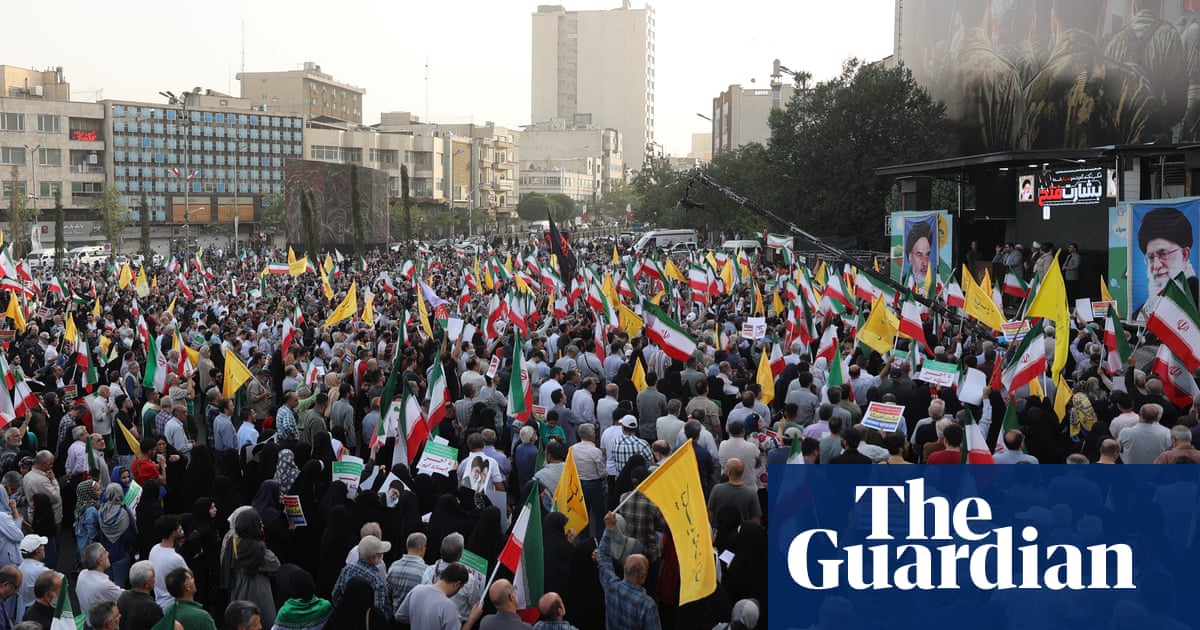People from the Tehran area said the hours of darkness before Donald Trump’s ceasefire took hold were the most terrifying of the war asIsraelintensified its bombardment.
“We felt jets flying so low above our apartment that the windows shook. The bombing intensified to a level I’ve never experienced before. People ran into the streets, terrified and panicking,” said Mariam, 39, from the village of Kordan, about 30 miles (50km) north-west of the capital. Like everyone quoted in this article, she chose to use a pseudonym.
When residents ventured out in the streets after the sun rose on Tuesday, their first question was what kind of country the bombers had left in their wake.
“There’s a silence now, like a pause in breath before something worse,” Mariam said. “We live in a nightmare that won’t end. I’m scared, and I don’t know what tomorrow will bring. I don’t know if the war will really end.”
Most of the Iranians the Guardian talked to were pessimistic, fearing the regime would use the war as a pretext for rolling back some of the liberties carved out by thefemale-led resistance of the past few years.
“We had neutralised the ideology of these people. They were culturally and in everyday life bent to our will,” said Shirin, a middle-aged Tehrani woman. She was referring to the fact that before the war the regime’s enforcers had for the most part given up making women who did not want to wear the hijab.
The regime had largely retreated from the private sphere of ordinary Iranians. Shirin was worried it would now return with a vengeance. “They now can become as powerful as they were 10 years ago,” she said.
In the course of the war, Trump and the Israeli prime minister, Benjamin Netanyahu, made direct appeals to the Iranian people to rise up against their rulers. Such appeals mostly fell flat, however, even among ardent opponents of Iran’s theocratic establishment.
For many Iranians, they were just two more angry old men telling them what to do.
“I do not trust Trump. He changes his mind every few seconds. We Iranians deserve better than people like him, Khamenei and Netanyahu who are deciding our fates,” said Nazanin, 28, a Tehrani movie producer. “The whole time we were screaming that we didn’t ask for this war.
“Today they’re going to parade on the streets and all the people you will see in the victory parade are just pro-regime hardliners. Now we will suffer the consequences because a wounded regime will pounce on us like prey.”
The authorities staged a “victory celebration” in the capital’sEnghelabor Revolution Square on Tuesday night. Posters and online propaganda drew in part on Persian folklore, and the image of Arash Kamangir or Arash the Archer, a mythic hero who shot an arrow with superhuman strength. Where it landed marked the border with a hostile neighbour.
Most Tehranis also predicted the regime would try to galvanise support through the special significance given to the holy month of Muharram, which begins on Sunday, with its climax falling on its tenth day, Ashura, which in Shia Islam is a day of remembrance and celebration of martyrdom.
“The regime is expected to intensify its repression in various areas, including stricter enforcement of mandatory hijab, following the ceasefire,” Mahdi, 42, from Tehran said. “During the month of Muharram, the government will likely emphasise the culture of martyrdom even more.”
“The regime will use it for its political gains and power,” he said.
Saeed, 23, a student leader and activist, pointed to Tuesday’s festivities and the air of triumphalism the authorities were trying to spread.
“The Islamic Republic is already acting like it won the war, like the whole thing was just a performance for Khamenei, Netanyahu, and Trump to inflate their egos,” he he said.
Unlike most people the Guardian spoke to, he did at least see a possible upside for ordinary people. “The ceasefire gave us a bit of hope but also a lot to think about,” he said. “The Islamic Republic’s shallow propaganda about ‘security’ has collapsed. The idea that they’ve always used as an excuse to suppress us is now broken.
“One possible gain from all this might be the space to build a real third way, something beyond just Islamic Republic loyalists or monarchists, or regime change activists who ignored us when we needed support most.
“Maybe we can create movements that actually care about us, and about Iran as a whole without having to choose between fascism and Islamo-fascism. But I also know from history that it will be hard.”
